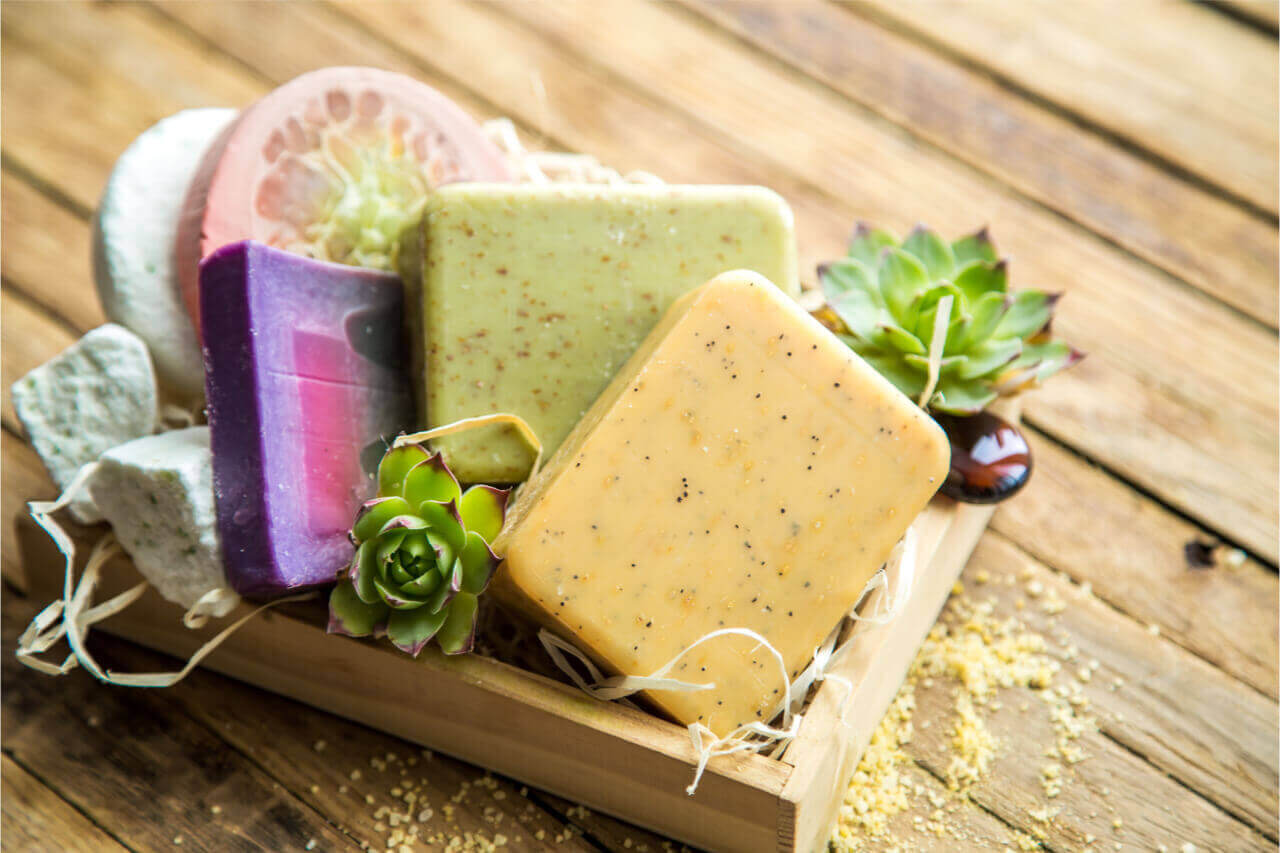Why Choose Organic Soap?
Why are organic soaps better than non-organic soaps? Because of its ingredients! Yes, ingredients make or break a product when it comes to skin care. Obviously, there are other factors such as shelf life and presentation, but ingredients, and the impact of product usage weighs more than these other factors.
Top 13 Benefits of Organic Soap:
Technically, mainstream or non-organic soaps like beauty soap, are no less than harsh detergents packed with harmful ingredients; sometimes even steroids which can lead to skin allergies, reaction to chemicals, skin sensitivity. Organic soap can help you minimize or even avoid this casual toxin exposure and absorption.
1. Organic is Better for Environment:
Organic means there will be no toxin waste to dispose of into the environment. No potentially lethal pesticides or chemical fertilisers are used to grow organic products. This reduces air, soil, and water pollution; hence, organic soaps are ecosystem friendly.
2. Cruelty-Free:
Organic soaps are mostly cruelty-free. They do not use animal fat and are not tested on animals.
3. More Economic:
Besides personal and environmental safety, organic soaps also have a good impact on the economy. It has various social benefits. Since most of the organic products are made by crafters individually in the local community or local market, so the majority of the money circulates within the same community. A consumer can easily access the producer directly at a local craft or a farm market.
4. Organic is Healthier:
Organic products are not only healthy to consume but also to produce. The process of producing organic products does not involve the use of any chemical sprays, fertilisers, or animal experimentation. Hence it’s a cycle of healthy production, consumption, and disposal because what goes around comes around.
5. It has Better Healing Properties:
Due to its natural ingredients like essential oils, aloe, coconut oil, honey, etc; organic soaps tend to have additional healing properties for skin conditions such as acne, eczema, and sunburn.
6. Easily Disposed:
As there are no chemical preservatives and toxins involved in the production, once the product is used, the leftover is easily disposed of. Organic raw material or used products are easy to dispose of as compared to chemical products.
7. Organic soap has Glycerine:
In non-organic commercially sold soap glycerine is extracted and used in other products such as body lotions and creams. However, in organic soaps, glycerine is used as a major ingredient. When it comes to your skin, glycerine is the best moisturising agent. Not only does it retains the moisture but also provides a soft touch to your skin. Use of glycerine is one of the factors that contribute to the high cost of organic soaps.
8. It is loaded with Antioxidants:
Organic soaps preserve the antioxidant properties of the ingredients being used. This can make a big difference because antioxidants help in slowing the skin’s ageing process and helps in rejuvenating the skin. Antioxidants leave your skin looking younger and fresh.
9. No Chemical Antibacterial Toxins:
Non-organic antibacterial soaps contain chemicals like triclosan, paraben, and other toxic petrochemicals that disrupt the hormones in humans and is harmful to the reproductive system as well. Organic soaps use natural antibacterial like tea tree and peppermint essential oils. These do not have any adverse effect. These essential oils also add up to the aroma and provide aromatherapy in addition to cleansing the skin.
10. Easy to customise:
Organic soaps are not mass produced and do not use preservatives, which limits its shelf life. Since organic soaps are produced in small batches at a local level, it can be easily customised to fit the customers’ requirements. The consumers have a variety of aroma, texture, color, shape, and size to choose from. It can be grainy with a dash of peppermint or smooth with coffee and cinnamon aroma.
11. Maintain PH level:
The PH level of organic soaps is almost 9 to10, which means that organic soaps are not so harsh and are gentler on the skin. Use of natural ingredients such as coconut oil not only provides moisture to the skin but also maintains the ph level of your skin.
12. No Preservatives:
The limited shelf life of organic products is because it’s all natural without any additional preservatives. This is a good thing because mostly preservatives are chemicals that harm our health.
13. An ideal choice for Vegans:
Since organic soaps rely more on using botanical extracts and herbs to achieve the target, it is an ideal choice for vegans. Mostly organic soaps do not use animal fats. Instead, coconut and palm oil are used as base oil along with essential oils extracted from a variety of flowers (rose, lavender), plants(tea tree, peppermint), spices(cinnamon, clove) and even fruits such as lemon and orange.
Ingredients used in Organic Soap:
When shopping for skin care products, it is extremely important to thoroughly go through the list of ingredients used. Some companies label their products as natural, but when you review their list of ingredients, it’s loaded with chemicals. Most commonly used set of ingredients in organic soaps are:
Aloe Vera
Goat’s Milk
Olive Oil
Using all natural and organic skin care products is a long term investment in your health because your skin absorbs chemicals and then transfers it to your bloodstream. Skin is the largest organ of the body, deserves the utmost care. It deserves no less than the best quality chemical free products for its nourishment.

